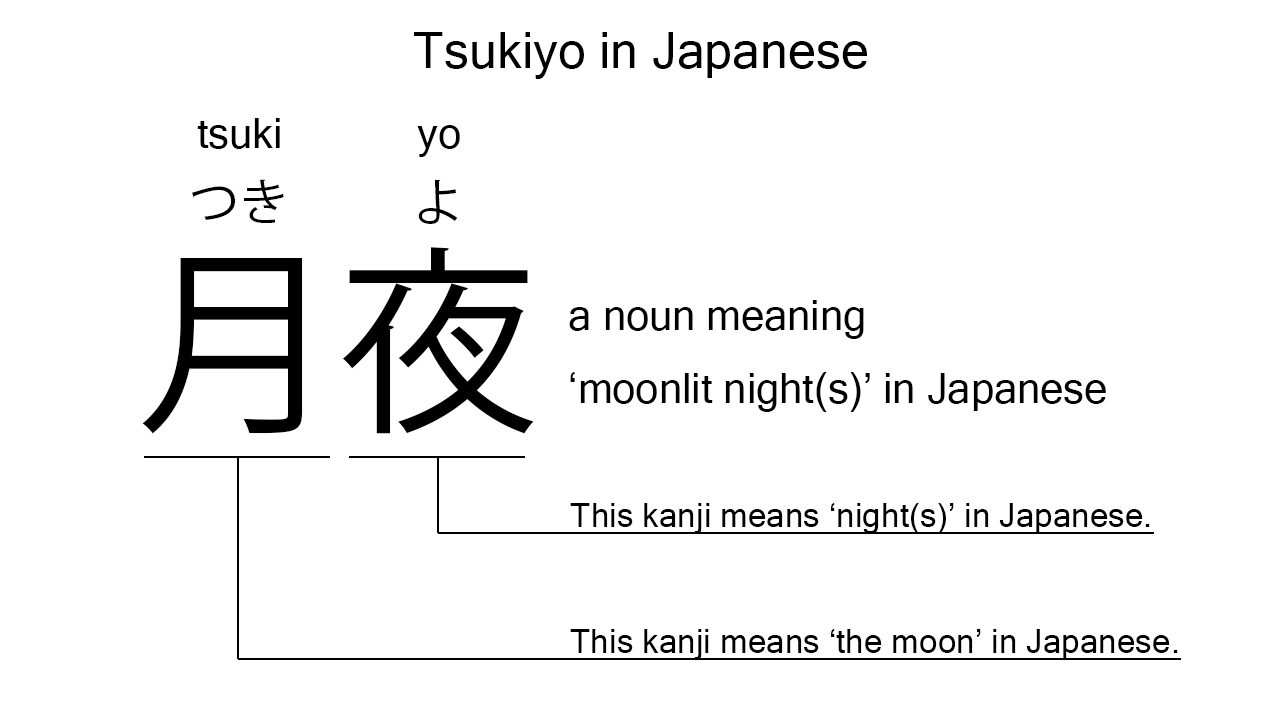What does “tsukiyo” mean in Japanese?
Native speakers say “tsukiyo” to mean ‘moonlit night’ in Japanese. Perhaps, some Japanese learners know this word as it is sometimes used in Japanese movies, songs, novels, manga, anime, and the like. In this blog post, however, I will explain this word in detail based on its kanji expression. And also, I will explain how to use it through example sentences. My explanations would help Japanese learners understand “tsukiyo” more clearly. Then, let’s get started!
Contents
Definition and meaning of “tsukiyo”
Let me start with the definition and meaning of “tsukiyo”.
- tsukiyo – 月夜 (つきよ) : a noun meaning ‘moonlit night’ in Japanese. This can also work as plural. Learn more about Japanese plural.
The definition and meaning are simple and clear. To understand this noun more clearly, however, let me explain its kanji characters in detail, one by one.
Tsukiyo in kanji
The kanji expression of “tsukiyo” consists of the following two kanji characters:
- 月 : a kanji character used to mean ‘the moon’ in Japanese.
- 夜 : a kanji character used to mean ‘night’ in Japanese.
These two kanji characters tell us that “tsukiyo” literally means a ‘moon night’ in Japanese. This literal interpretation is very close to the actual meaning.

When we meet new kanji expressions, we should check their kanji characters in detail to understand their meanings clearly and deeply. In many cases, kanji characters tell us a lot about the meanings of the expressions they form. Actually, here, we could get the better understanding of “tsukiyo” through the detailed kanji check above.
So far, I’ve explained the definition and meaning of “tsukiyo” together with its kanji characters. Then, let me explain how to use it through the example sentences below.
Example #1: how to say “moonlit night” in Japanese
boku wa tsukiyo ni kanojo to at ta – 僕は月夜に彼女と会った (ぼくはつきよにかのじょとあった)
I met her on a moonlit night.
Below are the new words used in the example sentence.
- boku – 僕 (ぼく) : a pronoun meaning ‘I’ in Japanese. This is used mainly by boys and young males.
- wa – は : a binding particle working as a case marker or topic marker. In the example, this works after “boku” to make the subject in the sentence.
- ni – に : a case particle used to say when someone does something. In the example, this is used after “tsukiyo” to say when the speaker met her.
- kanojo – 彼女 (かのじょ) : a pronoun meaning ‘she’ in Japanese.
- to – と : a case particle used to say with whom someone does something. In the example, this is used after “kanojo” to say with whom the speaker met on the moonlit night.
- at – 会っ (あっ) : one conjugation of the verb, “au”, which means ‘to meet’ or ‘to see’ in Japanese. In the example, it has been conjugated for the better connection with its following word.
- ta – た : an auxiliary verb used after a verb, adjective, or auxiliary verb to make its past tense form. In the example, this is used after “at” to make its past tense form, “at ta”.
This is a typical usage of “tsukiyo”. In this example, it works together with the case particle, “ni”, to say when the speaker met her.
Example #2: another usage of “tsukiyo”
watashi wa tsukiyo ga suki desu – 私は月夜が好きです (わたしはつきよがすきです)
I love moonlit nights.
Below are the new words used in the example sentence.
- watashi – 私 (わたし) : a pronoun meaning ‘I’ in Japanese.
- ga – が : a case particle used to make the subject word or the object word in a sentence. In the example, this is used after “tsukiyo” to make the object in the sentence.
- suki – 好き (すき) : the stem part of the na-adjective, “sukina”, which means ‘favorite’ in Japanese. Native speakers, however, often use this as an individual word to mean ‘to like’ or ‘to love’. In the example, actually, this is used to mean ‘to love’ in Japanese.
- desu – です : an auxiliary verb used after a noun or adjective to make it polite. In the example, this is used after “suki” to make it sound polite.
This is another typical usage of “tsukiyo”. In this example, it works together with the case particle, “ga”, to become the object in the sentence. When we want to mean ‘moonlit nights’ in Japanese, anyway, this noun is always a good option.
Summary
In this blog post, I’ve explained the definition and meaning of “tsukiyo” in detail based on its kanji expression. And also, I’ve explained how to use it through the example sentences. Let me summarize them as follows.
- tsukiyo – 月夜 (つきよ) : a noun meaning ‘moonlit night’ in Japanese. This can also work as plural. These two kanji characters literally mean a ‘moon night’ in Japanese. This literal interpretation is very close to the actual meaning.
Hope my explanations are understandable and helpful for Japanese learners.